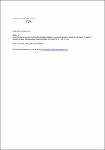Community-acquired methicillin-resistant Staphylococcus aureus: What do we need to know?
Witte, Wolfgang
Community-associated methicillin-resistant Staphylococcus aureus (CA-MRSA) has become a matter of concern worldwide, in particular in the USA. For the analysis of emergence and spread, clear definitions based on epidemiological origin are needed for discrimination between CA-MRSA, healthcare-associated community MRSA, and healthcare-associated MRSA (HA-MRSA). Although its role in pathogenesis is currently under debate, the capability for Panton-Valentine leukocidin formation is associated with the majority of CA-MRSA isolates from North America and from Europe. Most CA-MRSA isolates are attributed to clonal lineages different from HA-MRSA; there are, however, clonal lineages from which both HA-MRSA and CA-MRSA have been reported (e.g. ST1, ST5, ST8, and ST22); CA-MRSA ST8 (USA300), which is most frequent in the USA, has meanwhile been reported from Europe. CA-MRSA ST80 is widely disseminated in Europe; because of its pronounced oxacillin heteroresistance phenotype, cefoxitin-based assays are advisable for reliable detection. So far, CA-MRSA infections seem to be much less frequent in Europe than in the USA, where patients with particular predispositions and low social status are at especial risk.
No license information
Related Items
Show related Items with similar Title, Author, Creator or Subject.
-
2010-10-14ZeitschriftenartikelMethicillin-resistant Staphylococcus aureus (MRSA): burden of disease and control challenges in Europe Köck, Robin; Becker, Karsten; Cookson, B.; Gemert-Pijnen, J. E. van; Harbarth, S.; Kluytmans, J.; Mielke, Martin; Peters, G.; Skov, R. L.; Struelens, M. J.; Tacconelli, E.; Torné, A. Navarro; Witte, Wolfgang; Friedrich, Alexander W.Methicillin-resistant Staphylococcus aureus (MRSA) is a major cause of healthcare- and community-associated infections worldwide. Within the healthcare setting alone, MRSA infections are estimated to affect more than 150,000 ...
-
2010-12-01ZeitschriftenartikelHigh Level of Gastrointestinal Nosocomial Infections in the German Surveillance System, 2002–2008 Spackova, Michaela; Altmann, Doris; Eckmanns, Tim; Koch, Judith; Krause, GérardObjective: Surveillance of nosocomial infections (NIs) is well established in many countries but often does not include gastrointestinal infections. We sought to determine the proportion of NIs among all hospitalized ...
-
2011-06-02ZeitschriftenartikelClusters of infectious diseases in German nursing homes – observations from a prospective infection surveillance study, October 2008 to August 2009 Schulz, Mathias; Mielke, Martin; Wischnewski, NicolettaA prospective infection surveillance study was carried out among residents of seven nursing homes in and around Berlin, Germany, from October 2008 to August 2009. A considerable number of infections were found to occur in ...

